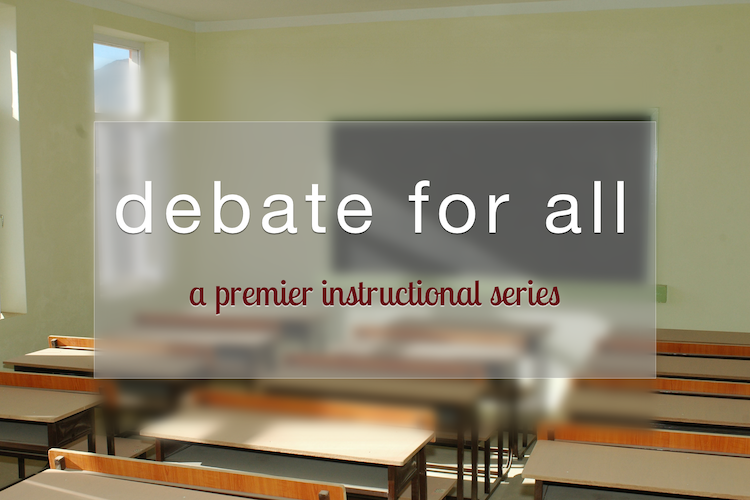Announcing: Debate For All

How do you learn the intricacies of LD framework debate if you can’t go to camp? What if policy-style arguments aren’t practiced in your region, but you need to be up on counterplans for your first major national tournament?
This week Premier Debate Today will roll out installments of a new series called Debate for All. The goal is to build a free, public resource for Lincoln-Douglas Debate lessons accessible to debaters of any skill, geographical location, experience, or socio-economic status. The posts will be geared toward providing tools for success in national circuit style LD. Eventually, we want to have a comprehensive guide to LD for debaters and educators that is easy to read and easy to use.
This is an open and ongoing project. Here’s how you can contribute:
Debaters, please comment below on what specific topics you would like to see covered. What topics is it hard to learn about on your own? What would someone new to the circuit need to know?
Educators, if you would like to author or contribute to any introductory content, please e-mail us at premierdebate[at]gmail.com. We would love to hear back on different ways to explain and to teach LD.
Stay tuned for upcoming segments on framework and counterplans!


10 Comments
1. Meta-Ethics and other complex philosophical arguments
2. Theory
3. Policy type arguments (Counterplans, perms, PICs, etc.)
1. How to start Case writing would be helpful to novices
2. How to arrange cases and arguments
3. Argument interaction and comparison
4. Framework arguments and how they function
5. KRITIK’s were so hard in the beginning for me
6. How to write Policy args/Run
7. How to write Theory/Run Theory/Respond to theory
I’d say that one of the biggest things to learn is weighing, which should be given a fairly high priority since it bleeds into everything else that people need to learn.
Cover these:
1) Meta-ethics
2) Policy (parametrization, disads, cp’s, k’s, etc.)
3) Impact calculus – framework included to some extent, of course
4) Theory
5) Time-allocation in speeches, particularly rebuttals
6) Casing
7) How to be sick with the lay
There should be a resource that helps match new debaters with potential coaches in their area.
Check out the Job Board under Resources. I know the coaches there and promise you can’t go wrong with any of them
1.) Weighing – as Brandon already said, it’s fundamental to winning any type of position.
2.) Strategy – this might be really hard to do in this format, but I think teaching debaters the strategic value in casing, layering, or even just rebuttals in general is one of the most important things debaters need to learn. If you teach a debater how to larp or read philosophic arguments, they need to know how to do it right. This might include basics like “Adding preempts in your framework” or “Having embedded weighing in the AC” and even “Quick way outs and what to extend”.
3.) Framework debate – this is the most important part of the case in my view, it determines what impacts matter and is probably a prerequisite to teaching thinks like Ks, disads, or CPs.
4.) Topicality – NSD and Victory briefs have written constant articles on theory but nobody really talks about topicality for some reason.
5.) Theory – Although a lot of topics have been covered on this already, I’m sure it can be done better.
More theory stuff: OCI, RVIs, Answering Pre-fiat theory, more stuff on how to answer NIB AFFs better. That sort of stuff.
PS: I am looking for a private coach who has good experience with running Theory and answering it. If you feel like you can help-we can work out private lessons and such. I think it would be better if you don’t coach in the Northeast circuit. I compete nationally but I don’t want to mess up judging and stuff. Please put an email with a res and obviously what your name is. I probably need help cutting cards because my schedule is relatively difficult. I consider myself a K debater and had past experience in policy. I am a freshman in high school. I have a good knowledge on running counterpleas, word pics, ks, das and plans. For debate, I want to expand my options for winning rounds and be a better theory debater.
1) Impact Calculus
2) CP’s overview
3) Wacky K’s
4) Creating theory args in round
This is a really great project. I come from a small program and articles like these are always super helpful. Some things I would love help with:
1. how to beat back theory
2. how to plan out strategies before-round
3. any research advise would be incredible